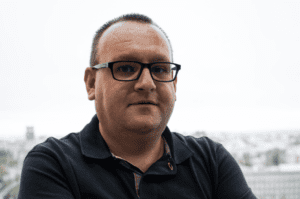
Going public in your vision for 2024?
As an active investor in SMEs for almost two decades, Paul Seabridge is CEO and Founder of Mergers, Acquisitions, Private Equity firm Opulentia Capital. They help companies achieve scale by taking them public, and over the years Paul and his team has completed over £250m worth of deals, across 90+ transactions, 9 countries and 26 industries. Paul is passionate about people, seeing them as the core of any business.
Preferring to work for himself and learn on the job, Paul cut his teeth in real estate, establishing himself as someone able to analyse strategic problems, identify opportunities and turn round companies to make them more efficient and more profitable.
Recently, Paul released his new book Build, Buy, Sell shares his expertise in buying or starting a business and developing it to its full potential, covering topics such as recruitment, sales, business finance and accounting and then how to sell on a business through an IPO, merger, acquisition or similar.
What is Opulentia’s USP?
Most private equity firms are investors, whereas, whilst we are investors, we are also entrepreneurs – all the founders in Opulentia Capital have started, built and sold a business, so we understand the challenge entrepreneurs face.
Having started in the recruitment industry, we have now participated in over 23 industries, made over £250 million worth of transactions and been involved as shareholders in 60 plus businesses.
As well as this, we aim to not only take care of the monetary aspect of a business owner’s exit, we also make sure to provide opportunity to the company’s current staff, protect the legacy of the brand and look for inorganic and organic growth opportunities for the business. Our approach towards managing the businesses post-acquisition is what makes us stand out from the crowd.
What is the main problem you solve for your customers?
We help businesses grow and scale. Our vision is to partner with well-run entrepreneurial businesses to ensure they have access to capital, resources, support and expertise needed to help them reach their full potential.
What made you start your business – did you want to rock the status quo, or was it a gap in the marketplace that you could fill?
Having sold my first start-up in 2010, I wanted to emulate being an angel investor to acquire or invest in businesses, not just providing capital for growth but also my expertise in business.
What are your brand values?
As a business, our brand values are: ambitious growth, shareholder value, trust, being ethical and diversity and inclusion.
Do your values define your decision making process?
Yes we only get involved with businesses that share the same values. When investing we want to make sure that people feel they are selling their business into a safe pair of hands, and this is easier when values are shared and we’re all on the same page.
Is team culture integral to your business?
Yes – I’d describe it as a high performance culture. Everyone shares in our journey to achieve our goals and vision.
What do you do to go the extra mile to show your team you appreciate them?
We offer our people a share scheme so they can be a part owner of the company and have a genuine vested interest in the future by benefitting financially from the work they do. There are regular incentives and trips abroad also.
What’s your take on inflation and interest rates – are you going to pass that on to your customers or let your margins take a hit and reward customer loyalty in these tougher times?
I’m not an economist but I believe higher inflation and interest rates will be around for a while yet. It costs more to do business (energy, wages etc) and borrow for growth – but that creates opportunity – it’s about demonstrating to your customers the value you create and the problems you can solve.
How often do you assess the data you pull in and address your KPIs and why?
We use a CRM that we can use to pull data off to see each stage of the sales pipeline. It also means we can drill down into the details to assess progress and identify any bottlenecks.
I don’t think there is a right or wrong way to address and track KPIs; you can track four KPIs or forty. If you have lots, this helps identify problems; if you have a few, you can really focus on the key metrics. As an investor in businesses, I typically only track revenue, gross profit margin and EBITDA (earnings before interest, tax, depreciation and amortisation), which essentially amount to cash- flow generated, I compare it to historic figures so I can see how we are improving. Data is an essential part of being able to do this well.
Is tech playing a much larger part in your day-to-day running of your company?
Yes, in fact we have even developed our own marketing software that has automated part of our processes, creating efficiency.
What is your attitude to your competitors?
Competition is healthy. There are some competitors we respect and even partner with.
Do you have any advice for anyone starting out in business?
I would recommend getting a mentor – someone that has been in your shoes and learn from them. Also hire the best people you can. Being a successful entrepreneur is about more than just you. Having the right (and the best) people in the right places doing the right things is crucial. Mentors are hugely beneficial and can help you avoid costly mistakes – though it’s likely you will still make mistakes along the way.
Then ensure you have a winning marketing and sales plan, and always strive to stay in financial control. Get those things right and you are on the right path. Get just one of them wrong and you will likely join the 95% of failed start-ups. Business success may not look how you thought it would – work out what success looks like for you and then begin to build it.
Entrepreneurs are renowned for flitting from one project to the next, it’s what I call ‘shiny new thing’ syndrome. One of the big lessons I learned here was that, when you fall out of love with a business, it’s time to get out. When you are no longer passionate, you lose focus and the business declines.
It can be a lonely and pressured place to be as the lead decision maker of the business. What do you do to relax, recharge and hone your focus?
I love to travel, and whilst I rarely switch off 100%, exploring new places and spending time with loved ones helps me to relax.
Do you believe in the 12 week work method, or do you make much longer planning strategies?
We have short, medium and long term goals. Each year we review the business plan and set a target for the year and then regularly review progress against the plan.
What is your company’s eco strategy?
We try to be environmentally friendly as possible. For example, we monitor our carbon foot print, look for sustainable energy suppliers and recycle where possible.
What three things do you hope to have in place within the next 12 months?
Expand the team further
Achieve £100 million of acquired revenue
Open a further office in Australia (we are already in Melbourne and want to be in Sydney also).
Read more:
Secrets of Success: Paul Seabridge, CEO of Opulentia Capital




